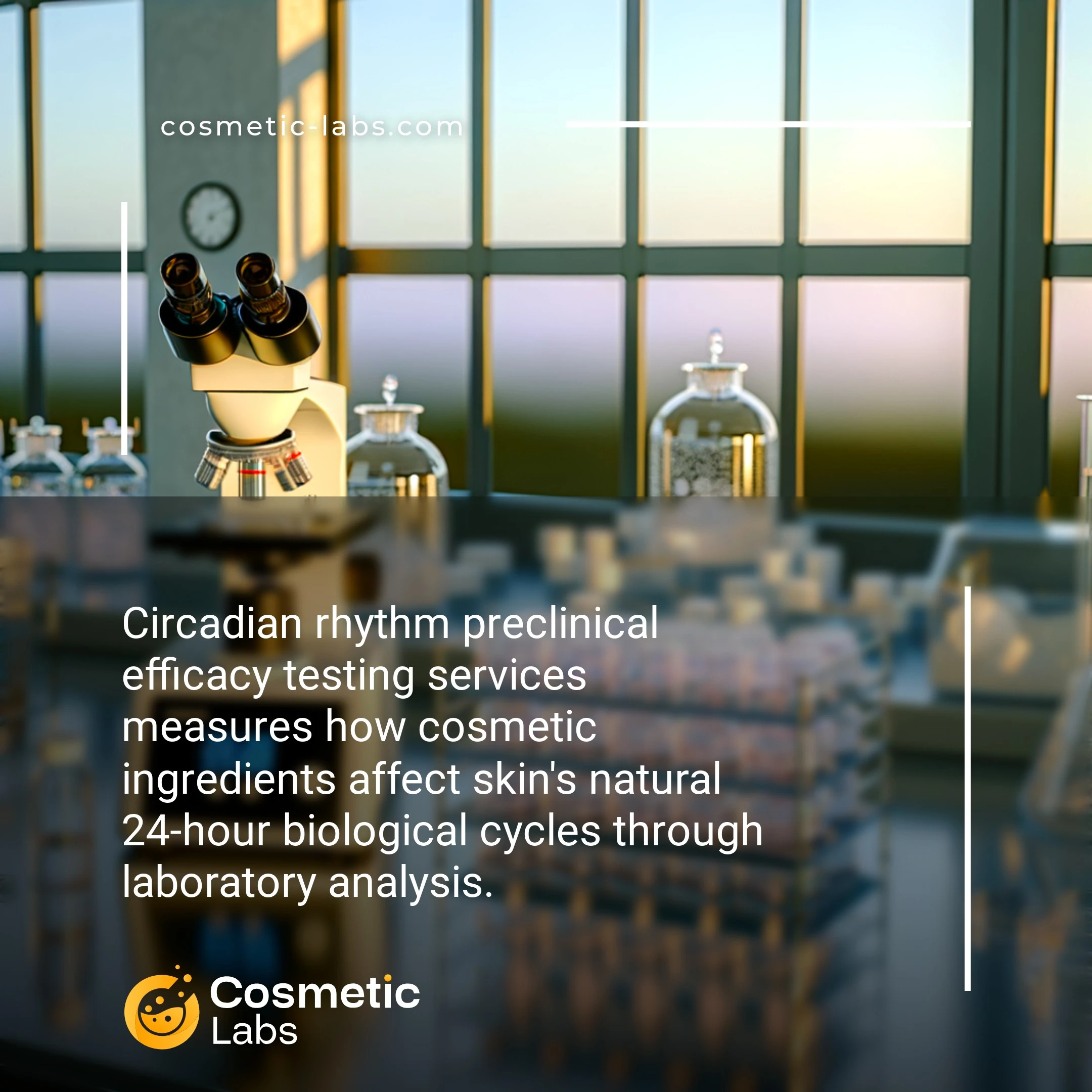Circadian Rhythm Testing Services for Beauty Products

What is Circadian rhythm efficacy testing?
Circadian rhythm preclinical efficacy testing services evaluate how cosmetic ingredients and formulations interact with your skin’s natural 24-hour biological clock. Labs use chronobiology protocols to measure ingredient performance at different times of day, testing cellular repair activity during nighttime hours versus daytime protection mechanisms. This testing reveals when active ingredients work best, helping you create targeted morning and evening products that align with skin’s natural renewal cycles.
Why do you need this service?
Beauty brands partner with our labs to validate nighttime repair formulations by measuring cellular regeneration markers during peak recovery hours. Teams also test anti-aging serums and sleep masks to demonstrate how ingredients synchronize with natural skin renewal cycles, delivering measurable improvements in collagen synthesis and barrier function that support marketing claims and regulatory submissions.
Who provides Circadian rhythm efficacy testing services?
All cosmetic labs providing Circadian rhythm efficacy testing services
There is no company providing these services at the moment.
Circadian Rhythm Preclinical Efficacy Testing Services
Circadian rhythm testing evaluates how cosmetic formulations interact with your skin’s natural 24-hour biological clock. Labs on our platform offer specialized circadian rhythm preclinical efficacy testing to validate claims about nighttime repair, morning protection, and time-specific ingredient delivery systems.
Chronobiology Testing Protocols
Testing labs measure how active ingredients perform during different circadian phases using cell culture models and skin tissue samples. They track cellular repair markers like DNA damage response, collagen synthesis rates, and antioxidant enzyme activity across 24-hour cycles.
Key testing parameters include:
- Melatonin receptor activation studies
- Clock gene expression analysis (CLOCK, BMAL1, PER genes)
- Time-dependent penetration rates
- Circadian metabolite profiling
Product Development Applications
Labs validate timing-specific product claims through controlled chronobiology studies. They test whether your night cream actually enhances cellular repair during sleep cycles or if morning serums provide optimal protection during peak UV exposure hours.
Testing applications cover:
- Day/night formulation optimization
- Ingredient release timing validation
- Skin barrier function across circadian phases
- Anti-aging efficacy during repair windows
Connect with specialized labs on our platform to design chronobiology testing protocols that support your product’s circadian-based marketing claims.
6 subcategories of Circadian rhythm efficacy testing services
There are no results matching your search
Practical Applications of Circadian Rhythm Preclinical Efficacy Testing
Beauty brands use circadian rhythm preclinical efficacy testing to validate time-dependent skincare claims and optimize product formulations for specific application windows throughout the day.
Anti-Aging Product Development
Labs measure cellular repair mechanisms during nighttime recovery phases using chronobiology protocols. Testing evaluates collagen synthesis rates, DNA repair activity, and antioxidant enzyme production across 24-hour cycles.
Brands developing night serums and morning protective formulas rely on this data to substantiate time-specific efficacy claims. Testing protocols track cortisol fluctuations, melatonin production, and skin barrier function variations to identify optimal active ingredient concentrations for different application times.
Sleep-Beauty Product Validation
Cosmetic labs test sleep-enhancing ingredients like peptides, botanical extracts, and aromatherapy compounds using circadian biomarker analysis. Studies measure skin temperature regulation, hydration cycles, and cellular turnover rates during rest periods.
This testing supports product positioning for overnight masks, pillow sprays, and bedtime skincare routines. Labs track sleep quality metrics alongside skin improvement parameters to validate dual-benefit claims that appeal to wellness-focused consumers.
| Testing Phase | Measurement Parameters | Typical Duration | Key Outcomes |
|---|---|---|---|
| Morning Assessment | Cortisol levels, UV protection factors | 6-10 AM window | Daytime protection efficacy |
| Evening Evaluation | Melatonin response, repair enzyme activity | 8-11 PM window | Nighttime recovery validation |
| Sleep Cycle Monitoring | Skin barrier function, hydration retention | 11 PM-6 AM tracking | Overnight treatment benefits |
Connect with experienced cosmetic labs on our platform to access specialized circadian rhythm testing capabilities for your next product launch.

